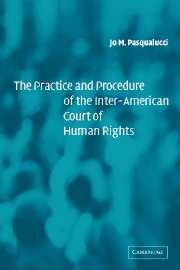Book contents
- Frontmatter
- Contents
- Foreword
- Preface
- Acknowledgments
- Table of cases
- Table of Articles of the American Convention on Human Rights
- Table of 2001 Rules of Procedure of the Inter-American Court on Human Rights
- Table of 2001 Rules of Procedure of the Inter-American Commission on Human Rights
- Table of other legal instruments and documents
- 1 Introduction
- PART I The advisory jurisdiction of the Inter-American Court
- 2 Advisory practice and procedure: contributing to the evolution of international human rights law
- PART II The contentious jurisdiction of the Inter-American Court of Human Rights
- PART III Provisional measures
- Appendix 1 American Convention on Human Rights
- Appendix 2 Rules of Procedure of the Inter-American Court of Human Rights
- Appendix 3 Statute of the Inter-American Court of Human Rights
- Appendix 4 Rules of Procedure of the Inter-American Commission on Human Rights
- Appendix 5 Form for presenting petitions on human rights violations
- Bibliography
- Index
2 - Advisory practice and procedure: contributing to the evolution of international human rights law
Published online by Cambridge University Press: 28 July 2009
- Frontmatter
- Contents
- Foreword
- Preface
- Acknowledgments
- Table of cases
- Table of Articles of the American Convention on Human Rights
- Table of 2001 Rules of Procedure of the Inter-American Court on Human Rights
- Table of 2001 Rules of Procedure of the Inter-American Commission on Human Rights
- Table of other legal instruments and documents
- 1 Introduction
- PART I The advisory jurisdiction of the Inter-American Court
- 2 Advisory practice and procedure: contributing to the evolution of international human rights law
- PART II The contentious jurisdiction of the Inter-American Court of Human Rights
- PART III Provisional measures
- Appendix 1 American Convention on Human Rights
- Appendix 2 Rules of Procedure of the Inter-American Court of Human Rights
- Appendix 3 Statute of the Inter-American Court of Human Rights
- Appendix 4 Rules of Procedure of the Inter-American Commission on Human Rights
- Appendix 5 Form for presenting petitions on human rights violations
- Bibliography
- Index
Summary
Some of the most important advisory opinions would not have been issued if the Court ‘had started from an outmoded voluntarist conception of International Law, with an instinctive attachment to the consent of the individual State for the exercise of not only the contentious but also the advisory jurisdictions of international tribunals.’
Advisory opinions in general
In the last decade, States and international organizations, sometimes led by non-governmental human rights organizations, have emphasized the advisory jurisdiction of international courts to address controversial or developing issues in international law. An advisory opinion is an authoritative but non-binding explanation of a question or issue. Advisory proceedings are less confrontational than contentious proceedings in that States are not parties and do not have to defend themselves against formal charges. A tribunal does not have the authority under advisory jurisdiction to order judicial sanctions or impose duties or obligations on any State. Although an advisory opinion cannot create legal obligations, it often exerts moral authority on States. As stated by Judge Bustamante, ‘there is a second difference of capital importance between an advisory opinion and a judgment of the Court, namely that the former is in no way binding upon those concerned, the opinion given having only moral authority, while the second imposes upon the parties alegal obligation having the force of res judicata’.
- Type
- Chapter
- Information
- Publisher: Cambridge University PressPrint publication year: 2003
- 1
- Cited by



